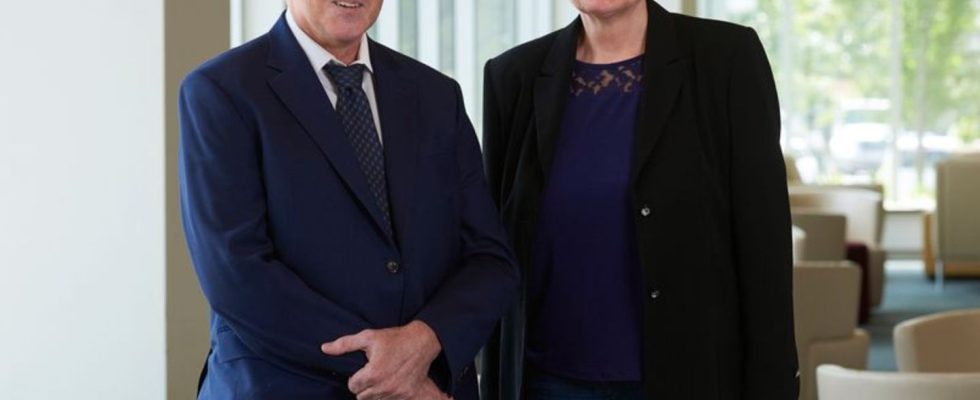Rarely has there been a topic as strongly favored for the Nobel Prize in Medicine as this year. The award goes to two researchers for crucial fundamentals in the development of corona vaccines.
This year, the Hungarian-born biochemist Katalin Karikó and the US immunologist Drew Weissman will receive the Nobel Prize in Medicine for their fundamental work on mRNA vaccines against Corona. This was announced by the Karolinska Institute in Stockholm. The Nobel Committee said that their research “contributed to the unprecedented pace of vaccine development during one of the greatest threats to human health in modern times.”
According to the Nobel Committee, the impressive flexibility and speed with which mRNA vaccines could be developed paves the way for vaccines against other infectious diseases. “In the future, the technology could also be used to deliver therapeutic proteins and treat certain types of cancer.”
Millions of lives were saved
“Several other vaccines against Sars-CoV-2, based on different methods, have also been rapidly introduced, and in total more than 13 billion Covid-19 vaccine doses have been administered worldwide,” said the Nobel Committee. “The vaccines have saved millions of people’s lives and prevented serious illness in many more, allowing societies to open up and return to normal conditions.”
There couldn’t be a better choice for the Nobel Prize in Medicine, wrote Federal Health Minister Karl Lauterbach (SPD) on X, formerly Twitter. “Katalin Karikó and Drew Weissman are honoring the two people who have been doing mRNA research for years against the trend. Without them, millions more people would have died of Covid.” The mRNA in the vaccines is the blueprint for a viral protein. This is produced in the body after vaccination. The immune system then turns against the viral protein.
Karikó and Weissmann were extremely happy about the news of the award and it was wonderful to talk to them, said the secretary of the Nobel Assembly of the Karolinska Institute, Thomas Perlmann. Karikó said she was completely overwhelmed.
Hungarian President Katalin Novak and Prime Minister Viktor Orban congratulated the researcher. Both emphasized that she was the first woman from Hungary to receive this award. “I congratulate the first Hungarian Nobel Prize winner! We are proud,” Orban wrote on Facebook.
Congratulations also from Biontech
The vaccine manufacturer Biontech congratulated Weissman and Karikó, who had been employed by the Mainz-based company for years. The company in Mainz announced that their work was pioneering and brought one of the important innovations for the mRNA-based Covid-19 vaccine from Biontech and Pfizer. “We appreciate Kati and Drew for their passion, persistence and commitment.”
Katalin Karikó, born in Hungary in 1955, currently works at the universities of Pennsylvania (USA) and Szeged (Hungary), and Drew Weissman (64) also works at the University of Pennsylvania. The most important award for doctors was increased by one million to 11 million Swedish crowns (950,000 euros) in 2023.
The corona vaccines from the Mainz company Biontech and the US company Moderna were the first two mRNA products to come onto the market. Researchers have been working on the technology for decades. For a long time, however, a lot of funding went to other approaches that were considered more promising.
Despite all the setbacks and adversities, Karikó, who initially conducted research in Hungary, continued to believe in the benefits of mRNA for medicine. From 1998 onwards she conducted research in the USA with Drew Weissman, whom she met by chance while copying specialist articles. “Luckily that was 1998 and I was still copying back then,” Karikó once told the New York Times.
The research duo achieved the decisive breakthrough when they exchanged a component of the mRNA and the mRNA was no longer broken down so quickly in the cell. However, a specialist article by the team in 2005 met with little response, both from experts and from donors.
In 2013, Karikó finally met Ugur Sahin, who founded Biontech with his wife Özlem Türeci. Karikó told the New York Times that he offered her a job that same day. Instead of two as planned, she stayed for nine years, Karikó told the Lepolodina newsletter in 2023. Since October 2022, she has only been an advisor to Biontech – in addition to giving many lectures and honors, she said she wanted to continue to have time to keep up to date with the latest research.
The Nobel Prize cycle has begun
With mRNA, a new class of substances is available for medicine, said the President of the Paul Ehrlich Institute (PEI), which is responsible for vaccines and biomedicine, Klaus Cichutek, to the dpa. A key advantage is the rapid production of a large number of vaccine doses. Vaccines can also be quickly adapted to new variants. Both have proven their worth during the corona pandemic. Possible future areas of application for mRNA include preventive vaccines against flu, for example, as well as therapies against cancer and rheumatism.
The Nobel Prize cycle began with the Medicine Prize. On Tuesday and Wednesday the winners of the physics and chemistry prizes will be named, followed by those for literature and for peace. The series ends next Monday with the so-called Nobel Prize in Economics, sponsored by the Swedish Reichsbank. All awards will be presented on December 10th, the anniversary of the death of the prize founder Alfred Nobel.

